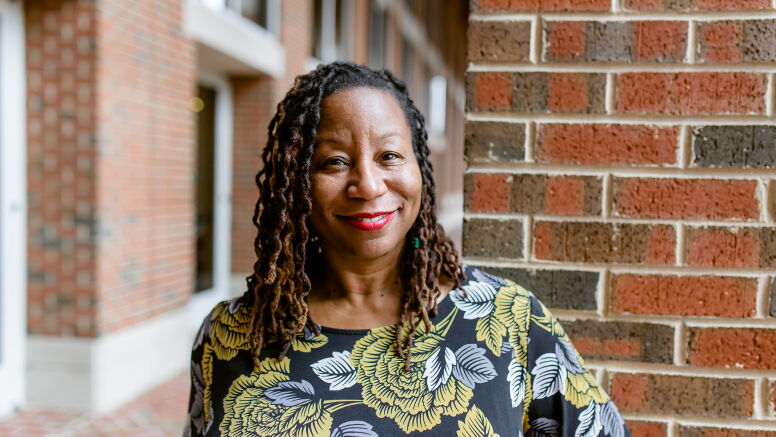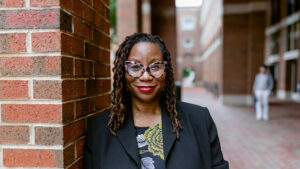News & Stories
Viewing social activism through a business lens

One of the most compelling stories of Professor Stephanie Mahin’s career is unfolding day by day, tweet by tweet.
Since joining the UNC Kenan-Flagler Business School faculty in 2018, the former journalist and public relations practitioner has focused on the ways organizations use social media to engage with a range of stakeholders — for better or for worse.
Following the murder of George Floyd in May 2020, Mahin’s courses and research have an extra layer of evolving complexity that reflects corporate social advocacy shifting to activism. Employees increasingly expect the businesses they work for to be clear about their stance on heated issues such as systemic racism, homophobia and gender inequality. Many consumers now have the same demands.
Talking the talk is not enough. Stakeholders, employees and consumers, especially those in Generation Z like many of Mahin’s students, expect corporations to walk the walk, from pledging millions of dollars to various social justice efforts to launching initiatives aimed at more diverse and representative workplaces.
“I have been amazed at how much society has shifted its focus and opinions on essentially requiring corporations to take stances on social and political issues,” says Mahin. “From a scholarly perspective, it’s been fascinating to watch corporations try to navigate this space. For some of them, the focus is not new. But for many, the focus is very new. They’re stepping into territory that they and some of their stakeholder groups have never been interested in getting involved with.”
Now one social media post might mean Mahin throws out her lesson plan for the day.
When Disney spoke out against Florida’s “Don’t Say Gay” bill, it became a discussion in Mahin’s Corporate Social Advocacy and Activism course. How will such a public statement impact Disney employees day to day? What language was used and why? How will investors respond?
When McDonald’s tweets “They were one of us” days after Floyd’s murder and lists the names of Black men and women who were killed by police, what does that mean to the company, its employees, its investors and its consumers?
They’re not easy discussions, but they’re always compelling.
“I always tell my students on the first day that this is not your typical business course, and if that’s what you want, you may want to reconsider,” says Mahin. “I want to ask hard questions to get them to think. I’m not willing to just hand them the answer. And there’s often not just one answer.”
Charting her own course
Mahin’s career has never been predictable.
 Growing up in the small town of Rantoul, Illinois, she was unafraid to make her own opportunities. When she wanted to do “the news” she convinced a local public radio station to hire her even though they had never covered news and she was still in high school.
Growing up in the small town of Rantoul, Illinois, she was unafraid to make her own opportunities. When she wanted to do “the news” she convinced a local public radio station to hire her even though they had never covered news and she was still in high school.
Always a creative thinker and a natural storyteller, Mahin decided to become a journalist in high school, and went full-steam ahead despite serious bumps in the road. After graduating from college, she accepted a radio job in Kokomo, Indiana. She was horrible, she says, and expected to be fired at any minute. Undaunted, she instead landed a production job at CNN in Atlanta.
“I don’t know what it was about me, but I was just always so fearless with anything that I wanted to do,” says Mahin. “I had no problem figuring out ways to make it happen.”
TV news was a better fit, but after seven years as a news reporter, including stints in Winston-Salem and Raleigh, Mahin wanted something new. So, she made it happen.
She joined UNC Health as an internal communications manager and spent 11 years as its national media relations manager. She led communication efforts through SARS, the Ebola virus and the first global flu pandemic in four decades.
She loved the work and discovered she also loved teaching while guest lecturing on crisis communication for Carolina journalism students.
“I started getting excited every time I was asked to speak,” says Mahin. “The students were always so energetic. I felt like I was getting fresh ideas from them as well. I thought, ‘You know what? I think I kind of like this.’”
The fearlessness served her well again. Mahin left the job she adored to earn a PhD from the UNC Hussman School of Journalism and Media, where she was a Roy H. Park Fellow. A year into her first teaching job as an assistant professor of communication at the University of Indianapolis, she did something she very rarely did — looked back.
“When I got to Indianapolis, I missed North Carolina like nobody’s business. I had no idea that I would miss this place that much,” she says. So, I started looking for work back here. I love UNC and I realized that I didn’t want to leave it.”
“I always tell my students on the first day that this is not your typical business course, and if that’s what you want, you may want to reconsider,” says Mahin. “I want to ask hard questions to get them to think. I’m not willing to just hand them the answer. And there’s often not just one answer.”
The listener
Mahin had considered research to be something done by others. She was used to the immediacy of getting a story done quickly and getting it done first.
But Mahin’s research gives her something she didn’t quite expect and fits well with her inquisitive nature — the ability to dive deep into something she’s intrigued by at any given time.
Her research sheds light on a new era of corporate social responsibility and the power of social media. With co-author Olga Hawn, associate professor of strategy and entrepreneurship at UNC Kenan-Flagler, Mahin explored the initial reaction from investors to some of the 100 Fortune 500 companies who pledged action and made promises following Floyd’s death.
With Victoria Smith Ekstrand, associate professor at the UNC Hussman School of Journalism and Media, Mahin looked at how #BlackLivesMatter trademark applications are treated compared to those from derivative “Lives Matter” requests. Her paper soon to be published in the Journal of Women’s History is about the work of Black women in the 19th century to secure voting rights.
“By the very nature of being a Black woman, I’ve always been thinking of justice issues and ways that systems could be better,” says Mahin. “We are a business school that has always known students have to be able to communicate well. Having courses like corporate social advocacy and activism shows that we are invested in our students also wanting to be part of a society where corporations can be good societal actors.”
As carefully as Mahin watches her social feeds, she can’t predict what will happen next for corporate social activism. It could fade away and be dismissed as a trend or secure its place in day-to-day corporate engagement. Whatever the case, Mahin is listening.
“The rise of organizations taking notice and taking note of advocacy and activism has shifted the landscape,” says Mahin. “It used to be that activism or activist groups were this thorn in the side of corporations. And now making the decision to take a stand — or not — is something that many corporations simply cannot ignore.”